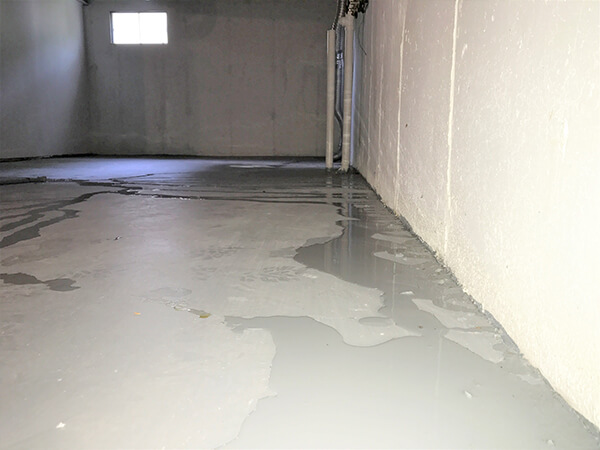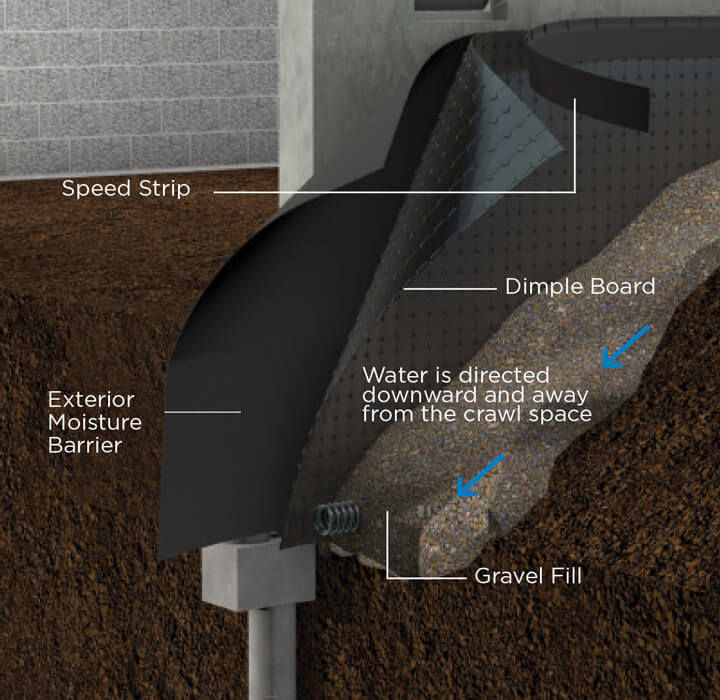A Homeowner’s Guide to Water Solutions for Basement Flooding
Wiki Article
Exploring the Various Methods of Basement Waterproofing and Their Benefits
Basement waterproofing is important for keeping a steady and completely dry environment. Various techniques exist, each with distinctive benefits. Interior sealers shield versus moisture breach, while outside systems resolve drain problems. Sump pumps and French drains manage water effectively, and dehumidifiers manage humidity levels. Understanding these options can aid homeowners make informed choices. The right service usually depends on particular scenarios and needs. What elements should one take into consideration when choosing the finest approach?Interior Sealants: An Effective Obstacle Against Dampness
Inside sealants work as a crucial line of protection against wetness invasion in basements. These items are made to produce a water-proof obstacle on wall surfaces and floors, successfully stopping water from leaking in. Offered in different types, consisting of sealers, paints, and finishes, they can fill splits and pores in concrete, making sure a more secure environment.The application procedure commonly involves cleaning the surfaces to eliminate dust and debris, followed by the mindful application of the sealant. Once healed, these items enhance the sturdiness of the cellar while lowering moisture levels, which can result in mold growth and structural damage.Moreover, interior sealers are commonly very easy to apply and can be a cost-effective option for property owners looking to reduce moisture problems. By supplying a reputable layer of security, they play an important function in safeguarding the basement room, maintaining both its honesty and functionality.Outside Waterproofing Equipments: Protecting Your Structure
When homeowners seek to secure their foundations from water damage, outside waterproofing systems provide a durable remedy. These systems commonly include using water-proof membrane layers and drainage systems to the outside wall surfaces of a cellar. By developing an obstacle against groundwater, they successfully protect against dampness from penetrating the foundation (Exterior Drainage Solutions).One significant advantage of exterior waterproofing is its capacity to deal with the resource of water invasion before it reaches the interior. This aggressive strategy not just safeguards structural integrity yet also improves the long life of the home.Moreover, outside systems can enhance the total drainage around the structure, minimizing hydrostatic pressure. This minimizes the opportunity of splits and heaving that can arise from water buildup. Therefore, house owners can delight in a dry, secure basement atmosphere, considerably boosting building worth and convenience. Inevitably, outside waterproofing systems are an essential investment in maintaining a healthy and balanced home foundation
Sump Pumps: Taking Care Of Water Build-up Effectively
Sump pumps play an important role in taking care of water build-up in cellars, giving an efficient remedy for homes susceptible to flooding or excess moisture. These devices are set up in sump pits, usually located at the most affordable point of a basement, where they collect water that seeps in from the bordering soil. When the water level increases, the sump pump turns on, effectively pumping out the excess water to a marked drain location, therefore protecting against possible damages to the structure and indoor spaces.There are 2 main kinds of sump pumps: completely submersible and stand. Completely submersible pumps are mounted underwater, making them much less noticeable and usually quieter, while stand pumps you can try this out are situated above the sump pit and are easier to maintain. By successfully managing water build-up, sump pumps not only secure versus architectural damages however also add to a healthier living setting by lowering moisture degrees and protecting against mold growth.French Drains: Rerouting Water Away From Your Home

Dehumidifiers: Minimizing Moisture Levels for a Drier Environment
Cellar waterproofing includes different approaches, and dehumidifiers play a substantial duty in preserving a dry setting. By effectively decreasing moisture levels, dehumidifiers assist avoid wetness accumulation, which can result in mold and mildew growth, structural damages, and unpleasant smells. These gadgets work by extracting excess dampness from the air, creating a healthier and extra comfortable space.In addition to enhancing air quality, dehumidifiers can enhance the effectiveness of other waterproofing approaches, such as sealing and drain systems. They aid preserve optimal humidity degrees, generally in between 30% and More Help 50%, which is crucial for preventing condensation on wall surfaces and floors.Moreover, contemporary dehumidifiers are energy-efficient and included features like programmable setups and automated shut-off, making them user-friendly. Generally, including a dehumidifier right into basement waterproofing prepares gives an important layer of defense against moisture-related concerns, thereby protecting the home's integrity.Regularly Asked Concerns

Exactly How Long Do Waterproofing Solutions Commonly Last?
Waterproofing solutions usually last in between 5 to 20 years, depending on the approach used, quality of materials, and ecological problems. Regular upkeep and examinations can assist prolong their effectiveness and overall life expectancy.Can I Water-proof My Basement Myself?
The private taken into consideration whether to water resistant the basement individually. They discovered that while DIY alternatives exist, understanding of materials and methods is important to ensure performance, and specialist help may offer far better long-lasting outcomes.What Are the Indications of Basement Dampness Issues?
Signs of basement wetness issues include noticeable water discolorations on wall surfaces, mildewy smells, peeling off paint, mold growth, and dampness on floors. High moisture levels might also indicate underlying wetness issues requiring attention to stop more damages.Just How Much Does Basement Waterproofing Cost?
The cost of basement waterproofing varies extensively, normally varying from $1,500 to $5,000. Elements influencing expenses consist of the seriousness of moisture problems, the picked method, and the geographical place of the residential or commercial property.Will Waterproofing Boost My Home's Worth?
The concern of whether waterproofing enhances a home's value often emerges among homeowners. Usually, effective waterproofing can enhance residential property allure, minimize damages risks, and potentially lead to higher resale prices, depending on the neighborhood real estate market. By creating an obstacle versus groundwater, they effectively avoid dampness from passing through the foundation.One remarkable benefit of outside waterproofing is its ability to attend to company website the source of water invasion prior to it gets to the interior. Sump pumps play a crucial role in handling water buildup in basements, providing an efficient service for homes vulnerable to flooding or excess moisture. When the water degree rises, the sump pump turns on, successfully pumping out the excess water to an assigned drainage area, thereby protecting against possible damages to the structure and indoor spaces.There are two major types of sump pumps: completely submersible and pedestal. Sump Pump Installation And Replacement. By routing groundwater and surface water away from the foundation, French drains aid prevent water build-up in basements and creep spaces, reducing the danger of architectural damages and mold and mildew growth.Installation commonly takes place around the perimeter of the home, making certain that water is efficiently diverted. Signs of cellar moisture concerns consist of noticeable water stains on wall surfaces, stuffy smells, peeling paint, mold and mildew development, and wetness on flooringsReport this wiki page